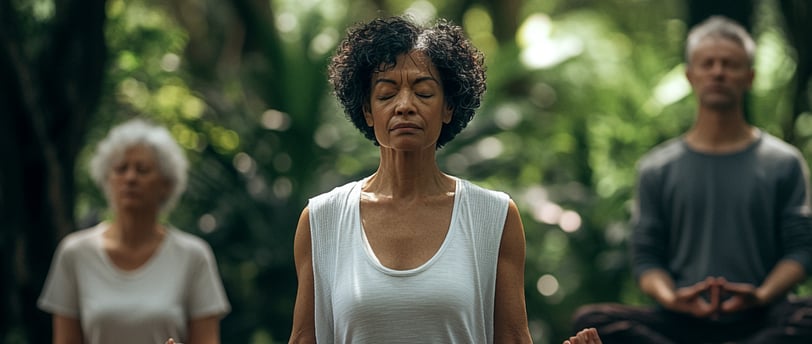Mindfulness and Meditation: How They Can Improve Your Mental Health
Discover the benefits of mindfulness and meditation for mental health. Learn how these practices can reduce stress, improve focus, and enhance overall well-being.
James Rodriguez, PA-C
9/3/20242 min read


In today's fast-paced world, many people are turning to mindfulness and meditation as powerful tools for improving mental health. These practices are not just trends; they have been shown to significantly reduce stress, increase focus, and promote a sense of peace and well-being. In this article, we’ll explore what mindfulness and meditation are, the mental health benefits they offer, and how you can start incorporating them into your daily routine.
What is Mindfulness?
Mindfulness is the practice of being fully present in the moment, aware of where we are and what we're doing, without being overly reactive or overwhelmed by what’s happening around us. It's about paying attention to your thoughts, feelings, bodily sensations, and the surrounding environment through a gentle, nurturing lens.
What is Meditation?
Meditation is a practice that involves focusing the mind on a particular object, thought, or activity to train attention and awareness, and achieve a mentally clear and emotionally calm state. While there are many types of meditation, all of them encourage mindfulness by helping individuals become more present and aware.
Benefits of Mindfulness and Meditation for Mental Health
1. Reduces Stress and Anxiety
Mindfulness and meditation have been shown to reduce stress and anxiety by calming the mind and body. Studies have found that these practices can lower cortisol levels, the stress hormone, and decrease symptoms of anxiety.
2. Improves Focus and Concentration:
Regular meditation can improve your ability to concentrate and maintain attention. This is particularly beneficial in today’s world, where distractions are constant and mental fatigue is common.
3. Enhances Emotional Health:
Practicing mindfulness helps increase awareness of your emotions, allowing you to process them more effectively. This can lead to better emotional regulation, increased self-compassion, and a more positive outlook on life.
4. Promotes Better Sleep:
Mindfulness and meditation can help quiet the mind, making it easier to fall asleep and stay asleep. This is particularly useful for those who struggle with insomnia or restless nights due to stress or anxiety.
5. Supports Overall Well-Being:
Engaging in mindfulness and meditation can improve your overall sense of well-being by fostering a sense of inner peace and contentment. Over time, these practices can lead to a more balanced and fulfilling life.
How to Get Started with Mindfulness and Meditation
1. Start Small:
If you’re new to mindfulness and meditation, start with just a few minutes each day. Gradually increase the time as you become more comfortable with the practice.
2. Find a Quiet Space:
Choose a quiet place where you won’t be disturbed. This can help you focus and reduce distractions during your practice.
3. Use Guided Meditations:
There are many apps and online resources that offer guided meditations. These can be helpful for beginners who may find it challenging to meditate on their own.
4. Practice Regularly:
Consistency is key when it comes to mindfulness and meditation. Try to incorporate these practices into your daily routine for the best results.
5. Be Patient:
Like any new skill, mindfulness and meditation take time and practice to master. Be patient with yourself and remember that there is no right or wrong way to meditate.
Takeaway
Mindfulness and meditation are powerful tools for enhancing mental health and well-being. By reducing stress, improving focus, and fostering emotional health, these practices can have a profound impact on your overall quality of life. Whether you’re new to mindfulness or a seasoned practitioner, incorporating these practices into your daily routine can help you live a more balanced and mindful life
© 2024. All rights reserved.